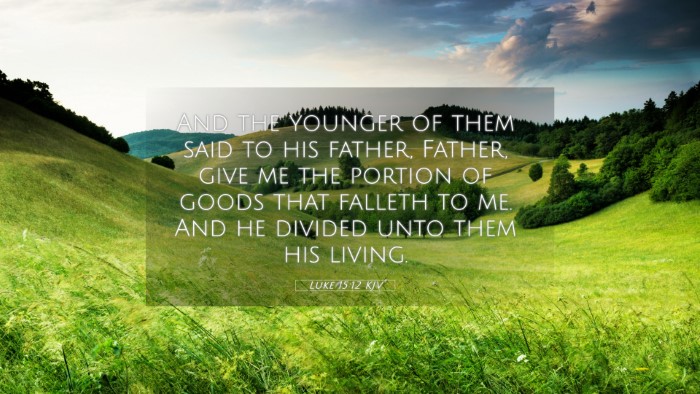Understanding Luke 15:12
Bible Verse: Luke 15:12
"And the younger of them said to his father, ‘Father, give me the portion of goods that falls to me.’ And he divided to them his livelihood." (Luke 15:12, NKJV)
Summary of Interpretation
The verse introduces one of the most famous parables in the Bible: the Parable of the Prodigal Son. It highlights a crucial moment where the younger son requests his inheritance before his father's death, reflecting a deep societal and familial breach of tradition.
This action can be interpreted in various ways, revealing themes of rebellion, greed, entitlement, and strained relationships that resonate throughout the Scriptures.
Commentary Insights
- Matthew Henry: Henry views this request as emblematic of the reckless nature often found in youth. He notes that by asking for his inheritance in advance, the son was essentially wishing his father dead, rejecting the social fabric that binds family relationships.
- Albert Barnes: Barnes emphasizes the audacity of the son’s request, shedding light on the cultural significance of inheritance. He argues that this act reflects a deeper spiritual truth: mankind's desire for autonomy from divine authority, a theme prevalent in many biblical narratives.
- Adam Clarke: Clarke points out that this request symbolizes the broader human tendency to seek immediate gratification, often leading to despair. He connects the narrative to the nature of sin and separation from God, foreshadowing the son's eventual downfall.
Cross-Referencing Biblical Texts
To deepen the understanding of Luke 15:12, it is helpful to explore connections with related verses. Here are 10 Bible cross-references that illustrate the themes and lessons found within this passage:
- Deuteronomy 21:17: Discusses the rights of the firstborn, highlighting familial inheritance systems.
- Luke 15:11: The introduction to the parable, setting the context for the son’s request.
- Proverbs 20:21: Advises against hastily gaining wealth, reflecting the folly of the younger son's request.
- Ecclesiastes 5:10: Explores the vanity of pursuing material gain, which resonates with the son’s greed.
- Galatians 5:1: Discusses freedom in Christ, paralleling the son's desire for liberation from parental authority.
- Romans 6:23: Highlights the consequences of sin, which can be seen foreshadowed in the son’s journey.
- Philippians 3:19: Raises concerns about those who prioritize earthly pleasures, akin to the son’s attitude.
- Luke 15:17: Depicts the son coming to his senses, which serves as a turning point in the narrative.
- James 1:15: Explains how desire leads to sin, correlating with the son’s desire for his inheritance.
- 1 Timothy 6:10: Warns about the love of money, echoing the themes of greed and spiritual emptiness.
Connecting Themes and Applications
The request of the younger son serves as a potent reminder of humanity's complex relationship with authority, desires, and consequences. The spiritual lessons derived from this verse invoke a reaction from believers and readers alike to reflect on their own lives.
Through Bible concordance tools, seekers can identify deeper connections between Bible verses and examine the thematic Bible verse connections intertwined in Scripture.
As we investigate further, cross-referencing Biblical texts will reveal a rich tapestry of faith, reminding us that the desire for independence can lead to spiritual emptiness but also to eventual redemption and reconciliation.
Conclusion
As we study Luke 15:12, it serves as a mirror reflecting the struggles of humanity with sin, choice, and the deep need for grace. By leveraging Bible cross-reference guides and pursuing comparative Bible verse analysis, one can uncover layers of meaning that enrich our spiritual journey.
This passage not only highlights the journey of a returning son but also embodies God's love and forgiveness, inviting all to come back to Him regardless of past mistakes.
Additional Tools for Bible Study
- Cross-reference Bible study: A method to analyze related passages.
- How to use Bible cross-references: Guiding users to effectively navigate scriptures.
- Bible reference resources: Materials for deeper study and understanding.
- Bible chain references: Linking verses for coherent thematic exploration.
- Comprehensive Bible cross-reference materials: Utilizing multiple sources for enriched study experiences.







